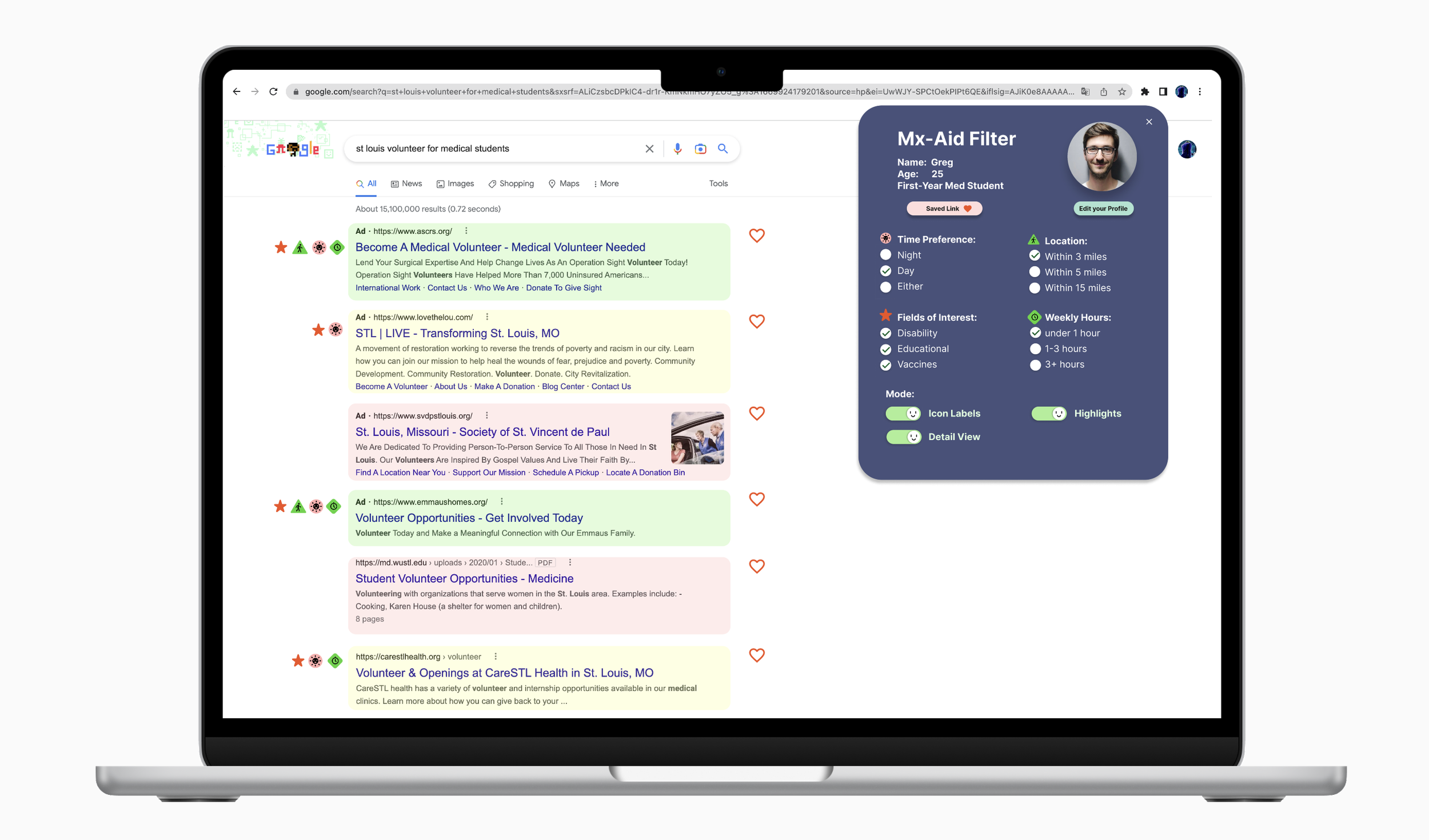Mx-Aid Filter - Chrome Extension for Medical Student Volunteer Matching 🩺
This UX research and design project explored how Washington University medical students connect with St. Louis community organizations. My team and I developed a practical solution to simplify the process of finding a volunteer opportunity that is an ideal fit for students. Through user interviews, secondary research, and iterative testing and product development, we investigated the pain points behind medical students' involvement in local health initiatives.
Our research revealed that while numerous opportunities exist, medical students often struggle with factors such as time management and finding the right organizational fit during their demanding academic schedules. This led us to design and prototype our final product: a Chrome extension (‘Mx-Aid Filter'‘) that streamlines the volunteer search process through intelligent filtering and compatibility indicators. (product presentation slides)
-
Research Question:
How can medical students be better supported during their process of connecting with ongoing health and wellbeing work in St. Louis communities?
I worked as a researcher/designer in a small team with engineers, designers, and marketing specialists. An essential part of my role was conducting user interviews with current WashU medical students and analyzing existing resources to understand the current state of community engagement opportunities.
We focused on three key areas: volunteer and networking opportunities within the St. Louis community, medical school programs and resources, and the transition challenges from undergraduate to medical school life.
-
Primary Research:
Each team member conducted an in-depth interview with a local medical students in order to gain insights into the realities of medical school life and community engagement.
Some key findings:
Students are passionate about community service but struggle with time management and finding suitable opportunities
The transition from undergraduate volunteering to medical school creates information gaps
Students value hands-on experiences that complement their clinical education
Since med school students are already busy, they want structured programs that don’t add overwhelming commitments
Secondary Research:
For our secondary research we analyzed three categories of existing resources:
Community Volunteer Opportunities: programs like Schnucks Screening for health screenings and Pediatric Life Savers for infant CPR training
Medical School Resources: student organizations like AMA and WUSM-GO gaming club, plus research support through MERU
Transition Support: best practices for adapting from undergraduate to medical school life including study habits and wellness tips
-
Key Insights Discovered:
Information about opportunities exists but is scattered across multiple platforms and documents (lack of centralization)
Students need better categorization and filtering of opportunities based on factors such as time commitment, interest area, and skill level
The gap between wanting to help and finding the right fit creates frustration and missed connections
Students benefit from peer experiences and mentorship in choosing community engagement
Design Implications:
Our research pointed us towards a solution that would provide clear categorization and allow students to consider factors such as time commitment and interest area to help them find the right volunteer opportunities.
For our final prototype, my team and I decided on a chrome extension which allows users to filter their search engine results based on various factors: time preference, location, fields of interest, and weekly hours. Using a color coding system, the chrome extension highlights each search result in red, yellow, or green, demonstrating the level of compatibility according to the user’s preferences.
-
Our research provided a foundation for understanding how medical schools can better connect their students to community volunteering. We discovered valuable insights into the intersection of medical education, community engagement, and user experience design, developing a practical solution for a complex, large scale issue.
Our chrome extension was presented to a board of designers and medical students, and received received positive feedback for its practical and intuitive design.
